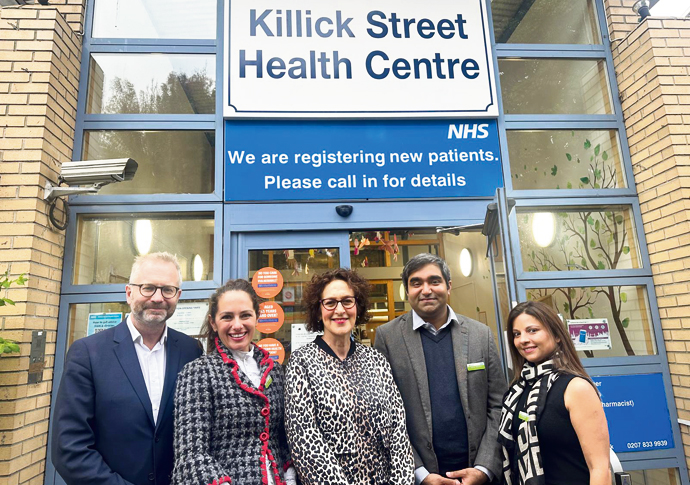Baroness backs private health on waiting lists
NHS patients’ ‘lives on hold’, says health minister
Friday, 24th October 2025 — By Isabel Loubser

Baroness Merron, centre, with staff at Killick Street Health Centre
A HEALTH minister has defended the government’s move to rely more heavily on the private sector as she visited a GP practice in King’s Cross.
Baroness Gillian Merron said that patients “welcomed” being treated in private facilities when waiting lists for NHS care were too long.
As the government yesterday (Thursday) announced a new policy to include questions about menopause symptoms as part of routine health checks, she told the Tribune that other measures were also helping to improve women’s healthcare. “Gynaecology waiting lists are coming down because we’re using capacity in the private sector,” she said.
“NHS patients who have been on a waiting list for too long, who are in pain, whose whole life in on hold, whose condition is worsening. They are still treated in all the tradition and practices of a freely available NHS in a private facility that has capacity.”
The debate over the use of the private sector has long been divisive amongst healthcare professionals and campaigners in the borough, some of which have argued that it simply takes money away from NHS services.
Shirley Franklin, from Keep Our NHS Public, said: “It means that private companies are profiting from people’s health needs. The money should always go back into the health service rather than into the pockets of rich private people. The money should not go into the pockets of shareholders.”
Baroness Merron said the new questions about menopause during health checks were a “practical, common sense measure” to ensure that women’s symptoms were highlighted and could be treated.
She said: “Women’s voices have for too long been ignored and women’s healthcare has for too long been neglected. There’s too much suffering in silence and thinking ‘oh well that’s how it is’. It also raises awareness in the medical profession as well as for women. It is about mainstreaming it.”
Doctors who work at the medical centre on Killick Street, which runs a specialist menopause clinic, said that the gynaecological service now gets around 500 GP referrals a month.
The hospital waiting lists are too long and become “devastating”, said Dr Karin Schachinger, leading many women to simply “put up” with gynaecological problems.
She told the Tribune: “I had a patient who was terribly suffering with periods. She thought it was normal to sit on the toilet whilst she was bleeding clots and have meetings on the toilet. I’m like ‘this is not normal, you don’t need to suffer like that’. Women trying to put up and cope with so much, they think it’s normal.”
Meanwhile, Rebecca Clay, a patient at the practice, said that the service had been “life-changing”.
She said: “The brutal pressure that the beleaguered NHS is under, that scenario of the GP practice wasn’t here. They said ‘take your time’ it’s OK.”
Ms Clay added: “By this time, I’d been on HRT three times in 10 years, had polyps and fibroids. I was completely at a loss because at this point I couldn’t have intercourse and couldn’t sleep. And for me, without those two things, frankly I’d rather die. I thought ‘I can’t live like this’. They said ‘we’ll take it slowly, try this and that’. I left this building on air.”